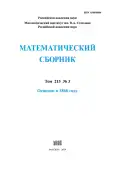On the quantified version of the Belnap–Dunn modal logic
- 作者: Grefenshtein A.V.1, Speranski S.O.1
-
隶属关系:
- Steklov Mathematical Institute of Russian Academy of Sciences
- 期: 卷 215, 编号 3 (2024)
- 页面: 37-69
- 栏目: Articles
- URL: https://bakhtiniada.ru/0368-8666/article/view/254272
- DOI: https://doi.org/10.4213/sm9981
- ID: 254272
如何引用文章
详细
We develop a quantified version of the propositional modal logic BK from an article by Odintsov and Wansing, which is based on the (non-modal) Belnap–Dunn system; we denote this version by QBK. First, by using the canonical model method we prove that QBK, as well as some important extensions of it, is strongly complete with respect to a suitable possible world semantics. Then we define translations (in the spirit of Gödel–McKinsey–Tarski) that faithfully embed the quantified versions of Nelson's constructive logics into suitable extensions of QBK. In conclusion, we discuss interpolation properties for QBK-extensions.
作者简介
Alexander Grefenshtein
Steklov Mathematical Institute of Russian Academy of Sciences
编辑信件的主要联系方式.
Email: katze.tail@gmail.com
without scientific degree, no status
Stanislav Speranski
Steklov Mathematical Institute of Russian Academy of Sciences
Email: katze.tail@gmail.com
ORCID iD: 0000-0001-6386-5632
Scopus 作者 ID: 55532074400
Researcher ID: L-2043-2016
Candidate of physico-mathematical sciences, no status
参考
- S. C. Kleene, “On the interpretation of intuitionistic number theory”, J. Symb. Log., 10:4 (1945), 109–124
- A. S. Troelstra, D. van Dalen, Constructivism in mathematics, v. I, Stud. Logic Found. Math., 121, North-Holland Publishing Co., Amsterdam, 1988, xx+342+XIV pp.
- D. Nelson, “Recursive functions and intuitionistic number theory”, Trans. Amer. Math. Soc., 61 (1947), 307–368
- D. Nelson, “Constructible falsity”, J. Symb. Log., 14:1 (1949), 16–26
- А. А. Mapков, “Конструктивная логика”, В ст.: “Заседания математического семинара ЛОМИ”, УМН, 5:3(37) (1950), 187–188
- A. Almukdad, D. Nelson, “Constructible falsity and inexact predicates”, J. Symb. Log., 49:1 (1984), 231–233
- S. P. Odintsov, Constructive negations and paraconsistency, Trends Log. Stud. Log. Libr., Springer, New York, 2008, vi+240 pp.
- С. К. Клини, Введение в метаматематику, ИЛ, М., 1957, 526 с.
- N. D. Belnap, Jr., “A useful four-valued logic”, Modern uses of multiple-valued logic (Indiana Univ., Bloomington, Ind., 1975), Episteme, 2, D. Reidel Publishing Co., Dordrecht–Boston, MA, 1977, 5–37
- J. M. Dunn, “Intuitive semantics for first-degree entailments and ‘coupled trees’ ”, Philos. Stud., 29:3 (1976), 149–168
- S. P. Odintsov, H. Wansing, “Modal logics with Belnapian truth values”, J. Appl. Non-Class. Log., 20:3 (2010), 279–301
- S. P. Odintsov, E. I. Latkin, “BK-lattices. Algebraic semantics for Belnapian modal logics”, Studia Logica, 100:1-2 (2012), 319–338
- S. P. Odintsov, S. O. Speranski, “The lattice of Belnapian modal logics: special extensions and counterparts”, Log. Log. Philos., 25:1 (2016), 3–33
- S. P. Odintsov, S. O. Speranski, “Belnap–Dunn modal logics: truth constants vs. truth values”, Rev. Symb. Log., 13:2 (2020), 416–435
- D. M. Gabbay, V. B. Shehtman, D. P. Skvortsov, Quantification in nonclassical logic, v. 1, Stud. Logic Found. Math., 153, Elsevier B. V., Amsterdam, 2009, xxiv+615 pp.
- С. О. Сперанский, “О модальной логике бирешeток и еe расширениях”, Алгебра и логика, 60:6 (2021), 612–635
- S. P. Odintsov, H. Wansing, “Disentangling FDE-based paraconsistent modal logics”, Studia Logica, 105:1 (2017), 1221–1254
- K. Sano, H. Omori, “An expansion of first-order Belnap–Dunn logic”, Log. J. IGPL, 22:3 (2014), 458–481
- Y. Gurevich, “Intuitionistic logic with strong negation”, Studia Logica, 36:1-2 (1977), 49–59
- S. P. Odintsov, H. Wansing, “Inconsistency-tolerant description logic: motivation and basic systems”, Trends in logic, 50 years of Studia Logica, Trends Log. Stud. Log. Libr., 21, Kluwer Acad. Publ., Dordrecht, 2003, 301–335
- D. M. Gabbay, L. Maksimova, Interpolation and definability. Modal and intuitionistic logics, Oxford Logic Guides, 46, The Clarendon Press, Oxford Univ. Press, Oxford, 2005, xiv+508 pp.
补充文件








